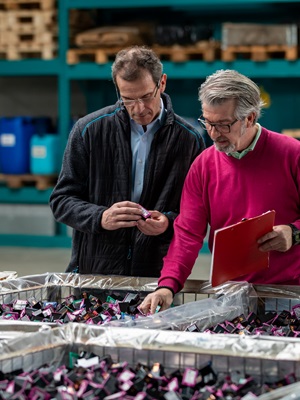Climate change poses an immense challenge to Hong Kong, a bustling metropolis where the hospitality industry stands as a formidable force. Amidst the multifaceted challenges posed by climate change, the industry holds remarkable potential to effect substantial change. From embracing carbon literacy to implementing sustainable practices, the sector can lead the charge in fostering a greener future for the city.
Understanding the Imperative: Working Together for Change
The foundation of sustainable transformation within Hong Kong's hospitality industry lies in collective action. As the industry faces the complexities of climate change, embracing carbon literacy, fostering education, collaborating with suppliers, and garnering government support are vital steps towards a more environmentally conscious future. Together, these initiatives form a united front aimed at instilling a culture of sustainability and responsibility within the industry.
Carbon Literacy:
In a city renowned for its diverse culinary scene, adopting carbon literacy becomes pivotal for the hospitality industry. Educating F&B management and staff on carbon footprints, sustainable practices, and their implications for climate change fosters a culture of eco-conscious decision-making. This knowledge empowers decision-makers to steer operations towards a more eco-conscious path.
Training and Education:
Initiatives aimed at equipping staff with sustainability knowledge and practical skills are indispensable. Educating the workforce on waste reduction strategies, energy-efficient practices, and the significance of sustainability cultivates a culture of environmental responsibility within establishments. For instance, collaborative workshops involving industry stakeholders and environmental experts can provide practical insights into sustainable practices. These sessions can address challenges, share success stories, and cultivate a shared commitment to sustainable change.
Manufacturers and Packaging:
Collaborating with manufacturers to reduce plastic packaging is critical. Encouraging suppliers to adopt eco-friendly packaging aligns with the industry's commitment to sustainability. Opting for biodegradable or recyclable materials presents a potent opportunity to significantly curb the sector's contribution to the city's pervasive plastic waste issue.
Government Support and Infrastructure:
Government backing is paramount for the industry's sustainability efforts. Infrastructure investments in efficient food waste management systems stand to benefit F&B establishments immensely. The implementation of industrial composting systems that convert organic waste into energy not only aids in waste reduction but also aligns harmoniously with the principles of a circular economy. For instance, facilities like O Park I and II in Hong Kong illustrate the effectiveness of such waste management systems. As these facilities near maximum capacity, the government faces the necessity of expanding infrastructure to accommodate escalating waste management needs. Exploring possibilities for expansion or investing in additional facilities that employ similar organic waste-to-energy conversion processes would be crucial steps towards meeting the growing demands for sustainable waste management in the hospitality sector.
Driving Towards Sustainability: Uniting Innovation and Responsibility
Sustainable practices within the hospitality sector go beyond the mere adoption of eco-friendly methods; they represent a commitment to innovation and responsibility. From implementing plant-forward menus to embracing technological advancements, operational changes, and fostering collaborations, the industry endeavours to integrate sustainability seamlessly into its core operations.
Plant-Forward Menu:
The introduction of a more expansive plant-based menu significantly contributes to sustainability efforts. By diversifying menu options with plant-based items, the industry not only reduces the carbon footprint associated with meat production but also caters to an increasingly eco-conscious consumer base. For instance, replacing traditional meat patties with black bean patties for burgers, highlighting seasonal vegetable dishes, and substituting milk with plant-based alternatives when serving coffee and cake baking are effective ways to showcase plant-based options.
Operational Changes:
The hospitality industry has the capacity to spearhead operational changes that yield substantial reductions in environmental footprints. The adoption of energy-saving measures, such as efficient lighting and appliances, presents an avenue to substantially curtail energy consumption. Furthermore, embracing water-saving practices and sourcing local, sustainable produce furthers the industry's commitment to environmentally responsible operations. For instance, implementing a measurement algorithm to track specific Key Performance Indicators (KPIs) provides invaluable insights. Establishing starting points and clear targets within this algorithm helps set achievable milestones in reducing energy and water consumption, enabling a systematic approach to meeting sustainability goals.
Collaboration and Partnerships:
Collaborative efforts among hospitality establishments, industry associations, and environmental organisations are pivotal. Engaging in partnerships for collective initiatives, such as waste reduction campaigns or advocating for sustainable sourcing, has the potential to create a ripple effect across the entire industry.
Customer Engagement and Education:
Empowering customers to make sustainable choices is integral to the industry's commitment to sustainability. Initiatives like menu labelling, highlighting eco-friendly dishes, or incentivising customers who bring reusable containers foster a culture of conscious consumption, inviting patrons to actively participate in sustainable practices. Educating customers through engaging initiatives, transparent communication, and interactive experiences within hospitality establishments significantly contributes to the industry's sustainability narrative. Clear communication channels and immersive experiences provide customers with valuable insights into the environmental impact of their choices. Informed consumers, equipped with knowledge about sustainable practices, become active proponents of conscious consumption. Their advocacy not only drives personal behavioural changes but also encourages broader adoption of eco-friendly practices within the community. This approach ensures that customer engagement goes beyond marketing strategies; it becomes a vehicle for imparting knowledge, fostering a sense of responsibility, and instilling a genuine commitment to sustainability among patrons.
Innovation and Technology:
Embracing technological advancements and innovative solutions is key to driving sustainable practices. From investing in renewable energy sources like solar panels to adopting smart waste management systems, technology can streamline operations while substantially reducing environmental impact.
Challenges and Call to Action: Navigating the Road Ahead
The journey towards sustainable transformation in Hong Kong's vibrant hospitality sector comes adorned with challenges that beckon innovation and collective resolve. Amidst the pursuit of sustainable practices, crucial challenges emerge, demanding focused attention and strategic action.
Financial Considerations:
Initial sustainability investments raise concerns, but emphasising the long-term cost savings and the positive brand image associated with sustainability can outweigh these initial financial considerations.
Regulatory Support:
While the industry drives internal change, governmental support through policies and incentives is crucial. This support can include tax incentives for eco-friendly practices, regulatory frameworks promoting sustainability, and subsidies for adopting green technologies.
SDG17: Partnerships for the Goals
SDG17 underscores the necessity of collective action. Inclusive partnerships accelerate sustainability initiatives, driving change across sectors and reinforcing the critical importance of collaborative efforts in achieving shared sustainability goals.
Embracing a Collective Vision
Hong Kong's hospitality industry stands at the forefront of change. Embracing carbon literacy, advocating for sustainable practices, fostering collaborations, engaging and educating customers, and embracing innovation are pivotal. Spearheading operational changes and promoting a plant-forward menu are instrumental in reducing environmental footprints. By embracing SDG17's collaborative spirit, the industry sets the stage for a greener, more resilient future for Hong Kong.
Posted 17 Jan 2024

















